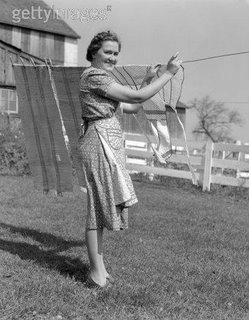
In this article by Meghan O'Rourke from The Slate a sociological study is examined that claims that women who are "progressive" (make that liberal) have more trouble being happy in their marriages. The conclusion- liberal women are too hard on their husbands and they make it difficult for their husbands to be happy. So, in a strange way, a way that would be anathema to liberal women, you could claim that women who make their husbands happy- by not nagging them, not having unreasonable expectations, appreciating their husband's work, and tolerating their gender differences will be happy themselves. Isn't it amazing how it still takes millions of dollars and all manner of sociological studies to reaffirm Christianity all over again?
From the article:
The sexual revolution tried to free women and men from set-in-stone roles. But the irony turns out to be that having a degree of certainty about what you want (and being in a peer group that feels the same way) is helpful in making people happy. Having more choices about what you want makes you less likely to be happy with whatever choice you end up settling on. Choosing among six brands of jam is easy. But consumers presented with 24 types often leave the supermarket without making a purchase. In much the same way, the more you scrutinize a relationship, the more likely you are to find fault with it. The study's authors, W. Bradford Wilcox and Steven Nock, speculate that fault-finding on the part of wives makes it hard for men to do the emotional work that stabilizes marriages. Meanwhile, traditionalist women—a significant portion of whom are Christian—expect less emotional work from their husbands, Wilcox and Nock speculate, which makes it easier for them to shake off frustrations, and less likely to nag. Whether or not any of this is the case, we do know that traditional marriages have the advantage of offering clearly defined roles. And traditionalist wives have a peer group fundamentally in agreement about what it wants and expects from husbands, creating a built-in support system.
And:
Consider the evidence that evangelical women—who in general endorse traditional gender roles—are better at adjusting psychologically to situations they don't find ideal than feminists are. Studies of evangelical wives who have to work for financial reasons show that, as rigid as gender roles are in their community, women are fairly adept at being what sociologist Sally Gallagher calls "pragmatically egalitarian." That is, they continue to be happy with the division of labor, and to see their husbands as providers, even though they'd prefer to be at home. It's a kind of utilitarian double-think, Gallagher and others argue—and it helps explain why traditionalist women who work might consider themselves happier than feminists who are still struggling to feel secure in their decisions.

1 comment:
Very cool design! Useful information. Go on!
buick regal supremes stop smoking in the hour Survey smoking quitting Dvd player to vcr to tv hookup Stop smoking subliminal Virginia state farm life insurance rate
Post a Comment